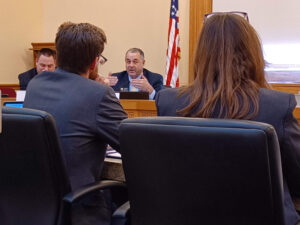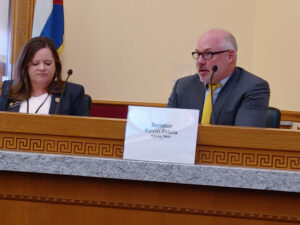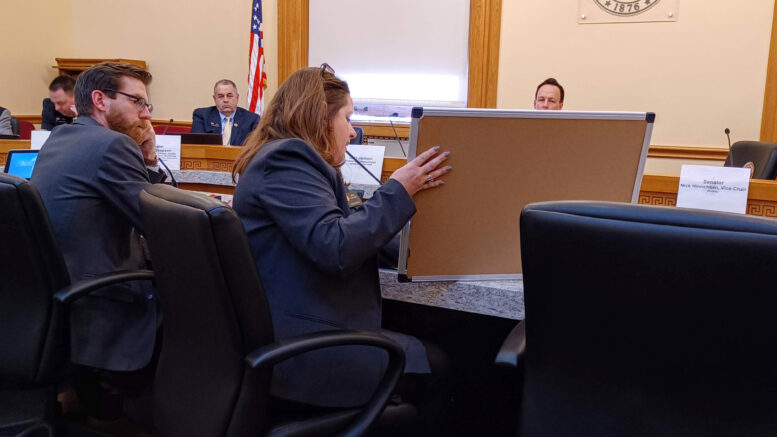Colorado’s right-to-repair movement, which began last year with wheelchair equipment, could spread this year to agricultural equipment — a decision that will lie with the Colorado Senate.
Following a six-hour hearing Thursday in which the committee chairman said he changed his vote in his mind 10 times, the Senate Agriculture and Natural Resources Committee advanced by party-splitting 4-3 vote a bill that would give farmers new control over their equipment. The debate over House Bill 1011 pitted some farmers against equipment dealers and divided the Rocky Mountain Farmers Union and the Colorado Farm Bureau — and discussion showed that many believed the proposal is about more than just tractors and combines.
HB 1011 would give consumers a right to repair agricultural equipment by requiring manufacturers to provide necessary parts, software and manuals to independent repair providers and equipment owners at a fair and reasonable price. Following on a 2022 law that provided powered wheelchair owners the same right to repair, it would make Colorado the first state to require such a right for farm implements, even as seven other states are considering similar legislation.
Proponents — including the Senate sponsors of the bill, Democratic Sens. Nick Hinrichsen of Pueblo and Janice Marchman of Loveland — argued that farmers now must wait for weeks at a time to get critical repairs and pay fees that can run more than $1,000. In a state that is home to 38,000 farms and ranches, owners of high-dollar farm equipment must be able to react more quickly during limited planting and harvesting windows and should not be held hostage to manufacturers demanding they use certain tools and dealers to fix their issues.
“Our farmers are feeling ripped off,” Marchman told the committee. “They want to own their equipment, and they feel like they rent it.”
Dealers defend current law
A succession of farmers and farm-equipment dealers argued, however, that both individuals and independent dealers can repair equipment now, as manufacturers like John Deere sell tools and information to them that handle between 90% and 98% of all needed repairs. Those repairs that require specified dealers deal often with significant safety issues or with emissions-control equipment on which federal law prohibits tampering, said Eric Wareham, vice president of government affairs for the North American Equipment Dealers Association.
Supporters and detractors painted contrasting images about the restrictions surrounding agricultural-equipment repair and how they impact farmers.
Danny Wood, the District 1 director of the Rocky Mountain Farmers Union who owns a farm northeast of Sterling, relayed how his new combine went out right as he began to harvest wheat, and going through the manufacturer for repairs left him unable to use it for 14 days. Meanwhile, Sen. Cleave Simpson, an Alamosa Republican who owns a farm, said that he’s never had a problem calling his dealer and getting the company to “bend over backward” to help him, suggesting the bill isn’t a solution for a problem that some farmers may be having.

Sen. Cleave Simpson discusses his opposition to a bill on the right to repair agricultural equipment Thursday with its sponsors, Sen. Nick Hinrichsen and Janice Marchman.
Broader implications of the bill
But underlying the arguments about whether equipment manufacturers and dealers are responsive to customer needs was a theme that the debate over HB 1011 was about a lot more than farm equipment. After the passage of the right-to-repair law on powered wheelchairs last year, several witnesses and legislators questioned whether this was just the second such effort to force right-to-repairs agreements onto a wide range of products and whether such government intervention violated contract law of the federal commerce clause.
“Some industries have seen the benefit of vertically integrating to control their product from beginning to end. They also want to control the software,” said Sen. Kevin Priola, the Henderson Democrat who was the only member of his party to oppose HB 1011. “I realize this bill is a symptom of a pushback against that … I just can’t be (with you) today because I feel there are unintended consequences in the short term.”
Kyle Wiens, CEO of online repair company iFixit, said the vote to allow people to bypass the increasing number of codes in equipment that manufacturers have set up comes at “a critical moment in software-enabled technologies.”
“What’s next?” Sen. Byron Pelton, R-Sterling, asked a panel of supporters testifying for the bill.
“After we went with wheelchairs, now we’re going for farm equipment.”
“I think it’s appropriate in every marketplace that people should be able to fix their stuff,” said Danny Katz, executive director of Colorado Public Interest Research Group (CoPIRG). “It seems ridiculous that the government needs to be involved in the marketplace, but it’s necessary.”
A national issue
The debate came just hours after the American Farm Bureau Federation announced a memorandum of understanding with manufacturing giant Case IH and New Holland to give ranchers and farmers the right to repair their equipment. That agreement followed a similar one the organization signed in January with John Deere.
Dealers, farmers and organizations such as the AFB said that such private-sector agreements are immensely preferable to government mandates and asked the state to let the market continue to do the work it’s doing to open repairs to more farmers and independent dealers. Several pointed to the agreements as a sign that the state doesn’t need to step into private relationships, noting that auto manufacturers have similar agreements across the country.
But Chad Franke, president of the Rocky Mountain Farmers Union, noted that the commonly accepted auto-industry right to repair came only after Massachusetts passed a law giving automobile owners such a right more than a decade ago. He and others implied that the memoranda of understanding are popping up now because farm-equipment manufacturers see the number of states considering right-to-repair laws and are trying to get ahead of them.
“The auto manufacturers have no incentive to break those MOUs in 49 states because they still have to follow it in one,” Franke said. “And in my view, if we pass this law, they wouldn’t break their MOUs in 49 other states because they still have to follow it one.”
That idea that Colorado could lead the way in setting a new national precedent regarding farm equipment was bothersome to some legislators, who expressed concerns about the constitutionality of the law as it applies to contracts and free commerce. Priola also suggested that Colorado might not want to push out as the state to test out the efficacy of every new legal idea such as the measure voters approved to permit the regulated sale of psilocybin and other psychedelic materials in November.
“Colorado is an ag state, don’t get me wrong. But compared to the San Joaquin Valley and the Central Valley in California, I find it hard to think that other ag states haven’t delved into this,” Priola said. “In the past 10 to 15 years, we have been the petri dish for a lot of ideas — like mushrooms. And I’m just not comfortable creating issues between ag folks in our state.”

Colorado state Sen. Kevin Priola discusses his issues with a bill that would create a right to repair for agricultural equipment. Beside him is Sen. Janice Marchman, one of the sponsors of the bill.
The deciding vote, however, belonged to Pelton, who localized it by saying he’d heard from swarms of cattlemen and wheat growers needing the help. But his “yes” vote was a conflicted one, he admitted.
“I’ve been having a lot of discussions with farmers in my district who are for this,” Pelton said. “But my principles are being attacked on this, as I don’t believe the government should be in the middle of these things.”
